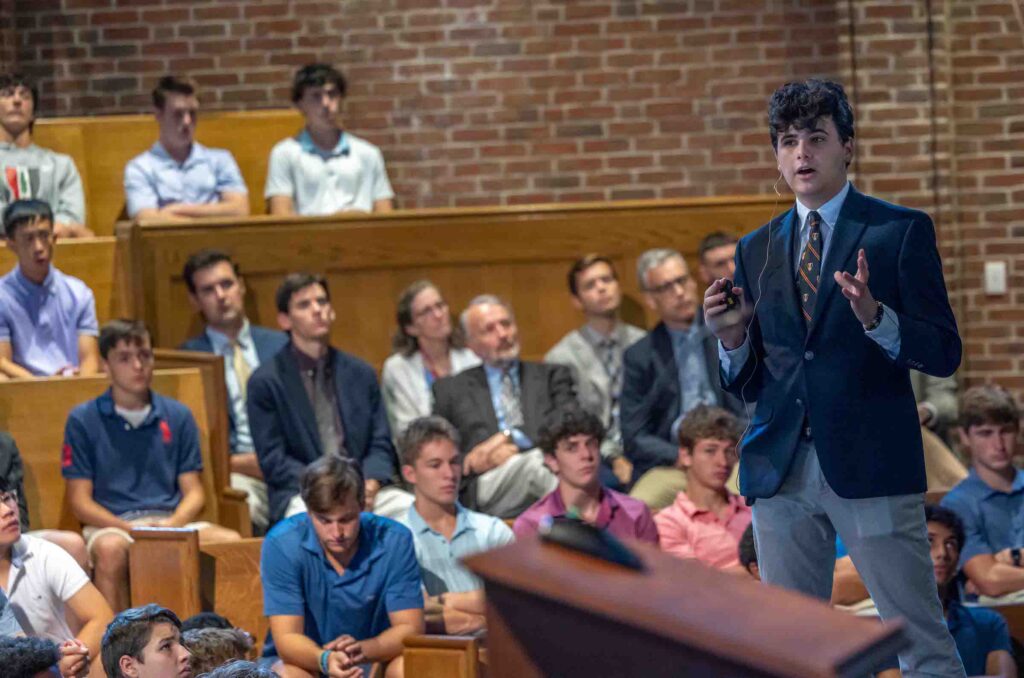Ezra Liebowitz (I) Shares Significance of Rosh Hashanah and Yom Kippur
On September 14, senior Ezra Liebowitz delivered a heartfelt and informative Hall presentation in the Smith Theater about the significance and traditions of the Jewish High Holy Days, Rosh Hashanah and Yom Kippur. Headmaster Brennan began the Hall by acknowledging the importance of sharing personal experiences, traditions, and stories of faith within the RL community. He emphasized that Roxbury Latin encourages the pursuit of truth and the exploration of various religions, recognizing that understanding and celebrating differences, including differences of faith, contribute to the school’s richness.
Ezra then shared the significance of Rosh Hashanah and Yom Kippur in the Jewish calendar—the holidays’ meanings and traditions. Rosh Hashanah, meaning “head of the year” in Hebrew, marks the beginning of the Hebrew calendar and celebrates the creation of humanity. It is a time for joyous celebration, togetherness with family and community, and reflection. One aspect of Rosh Hashanah, he explained, is the concept of teshuvah, which means “to return.”
“Although Rosh Hashanah is a very joyous occasion,” said Ezra, “it’s a time when you also want to reflect about yourself. You want to think about the past year, and about what you want to accomplish in the year ahead.”
Some of the common customs associated with Rosh Hashanah, Ezra continued, include eating apples and honey, which symbolize a sweet year; eating pomegranates, signifying fertility; and enjoying round challah bread to represent the full year ahead.
Ezra explained that Yom Kippur, meaning “Day of Atonement” in Hebrew, is—unlike the joyful celebration of Rosh Hashanah—a solemn day for personal reflection, fasting, and self-examination. Jews refrain from work, driving, and most activities, dedicating themselves to deep spiritual contemplation.
“Yom Kippur takes place ten days after Rosh Hashanah,” said Ezra. “It is the holiest day in Judaism—a somber and personal day during which you focus solely on reflection and on your relationship with God.”
Yom Kippur culminates with the sounding of the shofar, an instrument made from a ram’s horn, symbolizing the unity, the “calling together,” of the Jewish community. Ezra emphasized that Yom Kippur serves as a moment for Jews to seek forgiveness, make amends, and strive to be their better selves.
“After a very somber day of fasting,” Ezra said, “you’re tired, you’re hungry, you probably have a headache—so you finish the day with a break fast meal. It’s probably the best meal of the whole year! Every Jewish community has a different way of breaking the fast, different types of food—my family and I usually have bagels and lox. Once Yom Kippur concludes, it’s a happy celebration. We’ve broken the fast, and we’re finally into the next year and all that it brings.”
In addition to sharing the history and traditions of these holidays, Ezra also spoke at length about his own personal experience of Judaism and his relationship with God, underscoring that these relationships can be challenging, or complicated, and are deeply personal. He was open about portions of his faith that are more challenging for him, and that it’s the community of Judaism—the collective Jewish people of which he’s part—that holds so much meaning and importance for him.
In closing, Headmaster Brennan, thanked Ezra for his insightful and personal remarks, and he urged all students to consider the importance of these questions about faith, identity, and purpose in their daily lives, emphasizing that such introspection is vital for personal growth and understanding.

